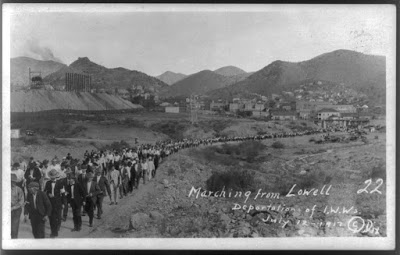Tomorrow, July 12, is the 102nd anniversary of the infamous Bisbee Deportation. This horrendous action of Americans taking illegal action against other Americans will be memorialized in Bisbee, Arizona, with a host of speakers. Historians will try to explain the illogical hatred and misplaced patriotism of individuals responsible for the deportation, locals will bring to life the deportees themselves, and murdered victims will be remembered. After sweeping the infamous act away for generations, the old mining town will relive each moment of the events from that early summer morning. Most residents know that history by heart now, mostly because of certain individuals’ hard research and preparation used to prepare a centennial two years ago. In fact, Bisbee has done a remarkable job of accepting its history—not rewriting it—instead celebrating the unique role the town played in western labor history. I was present for the centennial and because of my personal family relationship and subsequent research, feel somewhat connected to the events that led up to the deportation. Below is an excerpt describing the deportation from Frank Little and the IWW: The Blood That Stained an American Family.
At precisely 6:30 A. M. on July 12, newsboys circulated an early edition of the Bisbee Daily Review, its banner screaming, “Women and Children Keep Off Streets Today.” A siren at the Douglas smelter blared, not for warning of a Mexican invasion or Pancho Villa attack, but to engage more gunmen. Simultaneously, vigilantes with white armbands ambushed men arriving for morning picket duty outside Bisbee mines and businesses. Other men, armed with machine guns, rifles, and clubs, went door to door without warrants, waking up sleeping families. Husbands, fathers, and sons, prodded with gun butts, were ordered into the streets amidst wails of protesting wives and mothers. While remembering their hats, many men dressed sockless.
A procession of over one thousand men, many of whom were not strikers or even miners, began a three-mile march to the Warren baseball park at 9:00 A. M. Their women followed, climbing into the bleachers to observe what was happening. On the Calumet and Arizona Mining Company office roof, a machine gun was pointed downward toward the captives.

At 11:00 A. M., a train with nineteen El Paso and Southwestern Railroad cattle-and-box cars arrived from tracks at the rear of the ball field on orders of Walter Douglas. Crammed into the cars, deep with manure, were 1,186 men while armed guards stood on top. A few lucky husbands received hastily wrapped bundles of food from wives who fully understood the gravity of the situation. As the temperature climbed above 110 degrees, the train departed. Deportees in smothering boxcars watched their women stumble alongside, slowly fading into the haze of Warren. Without food and little water, the deportees journeyed past gunmen lined on both sides of the track and machine guns on knolls leveled at them. After 52 hours of travel with few stops, the train finally drew into a siding in Hermanas, New Mexico. There the undesirables were abandoned in the hot desert sun. For Bisbee residents, July 12, 1917, would be the day when “patriotism was pitted” against principles.
Interestingly enough, I discovered Jane Street, subject of my newest book, in Bisbee. She arrived just before the deportation to meet with Frank Little. I am currently writing the chapter that describes this meeting, and events from the Bisbee Deportation Centennial flood my brain as I set up Bisbee’s context in relation to Jane. Funny how I have come full circle.
On Monday, July 15, PBS is hosting the American documentary Bisbee’17, that was produced while I was in Bisbee two years ago. Meeting Robert Greene, writer and director, in an ancient-but-neon-lit bar up Brewery Gulch is a memorable moment for me. He thanked me for allowing his crew to film my presentation. No, I am not in the documentary.
See http://www.pbs.org/pov/bisbee17/
A July 12, 2017, NPR recording regarding the Bisbee Deportation used small parts of my presentation, click http://www.wbur.org/hereandnow/2017/07/12/bisbee-arizona-mining-deportation for a listen.